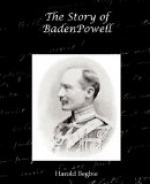mere act of punishment, there were many instances
of coolness and bravery. One man got detached
from the rest, and suddenly found himself confronted
by eight of the enemy. In an instant his horse
was shot under him, but almost in the same instant
he was standing in front of the eight with his rifle
to his shoulder. Before they could close on him
with their knobkerries and assegais, or before they
could shoot him down, he had used his magazine fire
with such deadly effect that four of his enemy were
dead and the other four were sprinting for dear life.
Baden-Powell had two pretty adventures in this engagement.
Having emptied his Colt’s repeater, he threw
it carefully under a peculiar tree, so that he might
find it when business was done; then he went to work
with his revolver. As he rode forward he came
upon an open stretch of ground, and the first object
that struck his attention was a well-knit Kaffir on
one knee covering his body with a Martini-Henry.
The distance was about eighty yards, and Baden-Powell,
telling the story, says that he felt so indignant at
the fellow’s rudeness that he rode at him as
hard as he could gallop, calling him every name under
the sun. But the Kaffir was not to be moved even
by the best-bred abuse, and he remained kneeling with
the rifle pointed at B.-P., until that horseman, with
locked jaws and gleaming eyes (those who know him
will understand), was only ten yards off. Then
he fired, and B.-P. says he felt quite relieved “when
I realised he had clean missed me.” That
nigger was shot immediately afterwards by one of Baden-Powell’s
men, who was riding to his help from behind.
The other close shave will make the nervous turn cold
to think of it. B.-P. had ridden to the help
of two men kept at bay by a nigger under a tree, and
when the nigger had been killed, he was standing for
a moment under the tree, when something moving above
him made him look up. It was a gun-barrel taking
aim at him. The man behind the gun, standing
on a branch, was so jammed against the trunk of the
tree as to look part of it, and while B.-P. was making
a note of this fact for his next lecture on scouting,
bang went the gun, and the ground in front
of his toes was as if a small earthquake had struck
it. That nigger’s knobkerrie and photograph
are now in the Baden-Powell museum—a museum
which began with butterflies and birds’ eggs,
and now includes mementos of nearly every tribe and
animal on the face of the earth.
After the fight Baden-Powell got back to Buluwayo
in time for late lunch, and—“made
up for lost time in the office.” From now
it was a case of office for many weary weeks, and
Baden-Powell could only at rare intervals steal away
for exercise, which he took in the form of hard scouting,
sometimes by himself, sometimes with Burnham—“a
most delightful companion.” His rides with
the famous American gave him great pleasure, and each
man, both born scouts, learned something from the
other. While he was enjoying these expeditions




